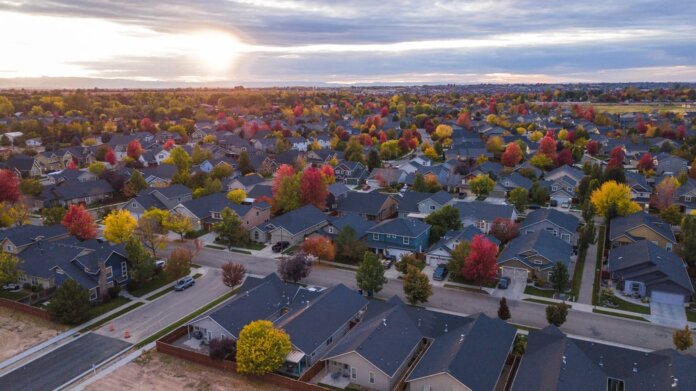The number of homes purchased by real estate investors in the first quarter declined 11.5% from the fourth quarter of 2021 and 16.5% from the third quarter of 2021, when investor purchases hit a record high, according to a new report from Redfin.
Still, investor purchases remained above pre-pandemic levels, and investors bought up a larger share of America’s homes than ever before. They purchased a record 20% of homes that sold in the first quarter, up from 19.2% one quarter earlier and 15.3% one year earlier. A decrease in overall home purchases nationwide allowed investors to increase their market share even while purchasing fewer homes.
Redfin’s analysis is based on county records across 40 of the most populous U.S. metropolitan areas and defines an investor as a buyer whose name includes at least one of the following keywords: LLC, Inc., Trust, Corp., Homes.
“Investor home purchases are falling for the same reason overall home purchases are falling: Surging interest rates and high housing prices have made it more expensive to get a mortgage and buy a home,” states Sheharyar Bokhari, Redfin’s senior economist. “While roughly three-quarters of investor purchases are made with cash, investors are still impacted by interest rates because they often take out loans to get that cash.”
The drop in investor purchases over the last two quarters may indicate investor purchases are past their peak and returning to normal. Up until the end of 2021, investor purchases had been climbing steadily since the pandemic began, in defiance of normal seasonality. Meanwhile, overall home purchases seesawed in typical seasonal fashion. Now it seems investor activity is getting back on track with the market as a whole.
“The fact that investors are still able to grow their market share while buying fewer homes signals they’re not feeling the pain of higher interest rates as intensely as individual buyers, many of whom are getting priced out of the housing market altogether,” Bokhari adds. “It also indicates that the individuals who can still afford to buy will continue to face competition from investors.”
While investor purchases have slowed, they remain above pre-pandemic levels, in part because investors can rent out the homes they buy and cash in on soaring rents. Demand for rentals is high because there aren’t enough homes for sale, and the ones that are for sale are often prohibitively expensive.
The top 10 metros by investor market share all saw investor purchases decline in the first quarter. Investor purchases fell 25.3% quarter over quarter in Atlanta, where investors bought 33.1% of homes that sold—the highest market share of any metro Redfin analyzed.
For metro areas, the report looks at the share of purchased homes bought by investors in Q1 2022 (market share) vs. quarter-over-quarter change in investor purchases: Atlanta, Ga. (33.1% vs. -25.3%); Jacksonville, Fla. (32.3% vs. -21.7%); Charlotte, N.C. (32.2% vs. -19.1%); Phoenix, Ariz. (29% vs. -8.6%); Miami, Fla. (28.2% vs. -3.6%); Las Vegas, Nev. (26.8% vs. -16.5%); Orlando, Fla. (25.7% vs. -12.9%); Tampa, Fla. (24.7% vs. -13%); Nashville, Tenn. (24.6% vs. -16.5%); and Columbus, Ohio (22.8% vs. -20.5%).
“Investors are on the hunt for deals. They’re waiting for homes to linger on the market for longer,” says Jennifer Bowers, a Redfin real estate agent in Nashville. She says investors are pulling back from the market because they’re hoping prices will drop. “Plus, they bought so many houses at the height of the pandemic that some amount of pullback is natural. A few months ago, 95 percent of homes for sale in Nashville would get at least one cash offer from an investor – one of my listings got eight. Today, most homes aren’t getting any. This is good news for regular buyers. While some of them will still get into bidding wars with investors, they won’t necessarily have to waive every contingency and offer astronomically over the asking price to compete.”
Investors bought a record 25.3% of all low-priced homes that were purchased in the metros tracked by Redfin in the first quarter, compared with 18.1% of mid-priced homes and 16% of high-priced homes.
Investor purchases of high-priced homes fell 27.1% quarter over quarter in the first quarter. Investor purchases of mid-priced homes also declined, down 19.1%. But investor purchases of low-priced homes increased 8.3%. The typical home investors purchased cost $427,174, up from $425,298 one quarter earlier and $372,076 one year earlier.
Single-family homes remained the most popular property type for investors, representing 73% of purchases in the first quarter, while condos/co-ops made up 15.9%, townhouses made up 6.6% and multifamily properties made up 4.5%. But investor purchases of single-family homes dropped 14.4% quarter over quarter, the most of any property type. Investor purchases of condos/co-ops and multifamily properties also declined, falling 4.5% and 0.4%, respectively. The only property type that saw an increase was townhouses, with investor purchases climbing 1.5%.
Read the full report here.
Image: Jimmy Conover on Unsplash











